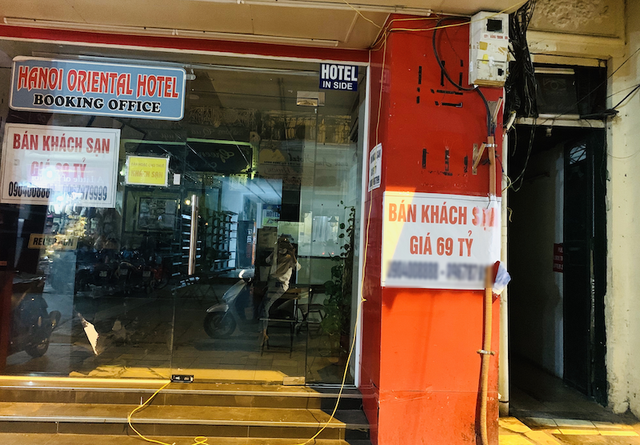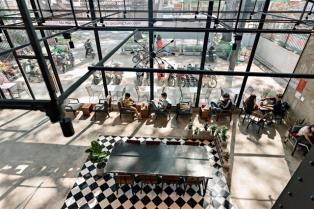Fusion Suites Saigon on Suong Nguyet Anh street in District 1, HCMC, is being listed for sale at VND1,165 billion (US$50 million).

Fusion Suites Saigon on Suong Nguyet Anh street in District 1, HCMC, is being listed for sale at VND1,165 billion (US$50 million).
It is on a 900sq.m plot of land and has 10 floors and 84 rooms.
It is one of hundreds of hotels up for sale in the city.
In Ha Noi, many are for sale in the old quarter.
Nguyen Thi Hong Hoa, who owns a hotel on Hang Manh Street, said she has decided to sell the hotel to cut losses.
Before the pandemic her turnover was around VND250 million (US$10,800) a month, but now she barely earns enough to pay salaries and other bills.
She had paid more than VND100 billion for it three years ago, but is now putting it on sale for just VND67 billion.
“I see no future in this field in such a situation, so I have to sell the property to cut losses,” she said.
A real estate broker in HCM City’s District 1 said, “With a click of a mouse, you can find information about hotel deals on various websites.”
Every day in major cities like HCM City and Ha Noi and famous tourism destinations dozens of hotels are announced for sale, he said.
The number is especially large in beach cities like Da Nang, Nha Trang, Vung Tau, Quy Nhon, and Phu Quoc, most of them two- or three-star hotels or mini hotels.
The decline in the number of both local and foreign tourists due to the COVID-19 breakout has led to the situation.
The pandemic, which hit Viet Nam in two waves, has left efforts to stimulate the tourism sector in tatters as many people cancelled tours and some popular destinations have had to be close, an industry insider said.
Data from the General Statistics Office shows that in the first eight months of the year the number of foreign visitors was down 66.6 per cent from the same period last year to only 3.8 million.
Tourism revenues in the period were down by more than half to VND13.1 trillion.
A note by real estate advisory firm Savills on the hotel industry performance in Ha Noi said the occupancy rate at three- to five-star hotels in the second quarter was a mere 21 per cent.
The city has nearly 10,000 rooms at 16 five-star hotels, 19 four-star hotels and 31 three-star hotels.
Many remain closed while some new hotels are ready but their owners have not decided to open them yet.
Market observers said in HCM City most four- and five-star hotels and resorts are able to survive though business is not very good since the number of foreign visitors to the city has dropped by 70-90 per cent since the pandemic began in March.
Many of them have had to offer discounts of 70-80 per cent to attract guests, most of whom are experts coming to the city to work.
Famous five-star hotels like Sofitel, Majestic, Nikko, Oakwood, New World, and Lotte Legend have to rent their rooms for VND1.7-2.5 million ($74-107) per night.
Two- and three-star hotels and mini hotels are also facing pressure.
Vo Quoc Trang, head of hotel investment consultancy at real estate consultancy Jones Lang LaSalle (JLL), was quoted by Vnexpress online newspaper as saying the hotel industry was among the earliest and hardest hit by the pandemic.
He confirmed that while four- and five-star hotels are holding up, those with three stars and below are facing challenges with the occupancy rate being just 10 per cent. Only around 35 per cent of them can sustain themselves, he said.
According to Savills Hotels, in the first half of the year revenues of hotels in Ha Noi and HCM declined by 56 and 64 per cent. The nation-wide average was down 55 per cent.
Analysts warned the last quarter of the year is unlikely to see an improvement.
Sales
In HCM City’s Districts 1 and 2, boards announcing the sale of hotels can be seen everywhere.
On Ly Tu Trong Street, many three- and four-star hotels are on offer at VND200-1,200 billion ($6.66 million – $52 million).
A four-star property at Ly Tu Trong intersection with Chu Manh Trinh Street with 18 floors and 150 rooms is available for VND1.2 trillion, 15 per cent lower than before the outbreak.
“But it has not yet been sold while we have already run out of cash to pay off the bank loan,” its manager, Tran Trung Hieu, said.
A four-star hotel with 80 rooms in the downtown area that cost over VND600 billion before the outbreak can now be bought at VND400 billion.
Huynh Ngoc Tam, the owner of a 12-room guesthouse on Hoang Van Thu Street in Tan Binh District, said he had invested over VND13 billion ($130,000) a year ago to buy the property, but now wants to sell it for just VND10 billion.
Not only the owners of hotels but also banks are seeking to sell properties.
Sacombank recently put on sale a 4,000sq.m hotel in Ly Thuong Kiet Street, District 11, mortgaged with it at a starting price of VND122 billion.
Analysts said while selling hotels could be the only way for some owners to stave off bankruptcy capital, it is very difficult to sell at this time since few investors are willing to take a risk amid a battered tourism market.
Thus, while many hospitality properties are hitting the market, the number of transactions is negligible.
SohoVietnam said many investors including foreign funds have expressed interest in tourism properties like hotels and resorts, and an estimated 10 trillion are available for this.
But analysts said many deals are unable to be finalised due to certain reasons.
For one, prices have not fallen by as much as many prospective buyers expect.
Many of the properties that are on sale are not very attractive while some good ones face legal issues.
The analysts also said there would be fewer mergers and acquisitions in the hospitality industry this year since the pandemic has made asset valuation and risk forecasting very difficult.
The limited number of flights prevents potential buyers from inspecting properties, and so negotiations are delayed, they pointed out.
Another reason is that investors now prefer operating rather than owning hotels, which helps keep down costs and minimise risks, they said.
Because of this they prefer not to buy a whole hospitality property but partyly invest into it so M&A deals in the hotels and resorts are likely to increase sharply in the near future. — VNS





